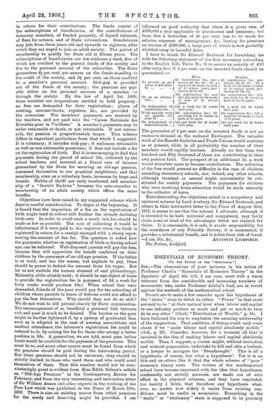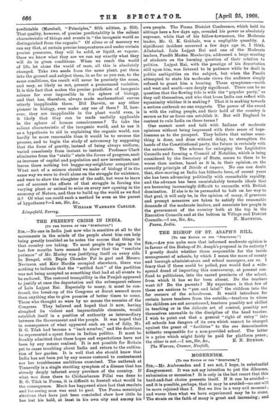ESSENTIALS OF ECONOMIC THEORY.
rTO TUN Eraros Or TEM " Srsorsroa.'1 Sin,—The observations of your reviewer in his notice of Professor Clark's "Essentials of Economic Theory" in the Spectator of April 4th will, I am sure, meet with a warm welcome from the considerable and increasing numbers of economists who, under Professor Ashley's lead, are in revolt against the methods of the mathematical school.
Permit me to make a few remarks upon the hypothesis of the " static" state to which he refers. "Prices" in that state are said to be "at their natural level when labour and capital in one industry produce as much and get as much as they do in any other" (Clark, "Distribution of Wealth," p. 16). I have italicised the any to emphasise the amazing universality of the supposition. That condition of things could only come about if we "make labour and capital absolutely mobile" (ibid., p. 29). Consider, however, for a moment all that is involved in the idea of making labour and capital absolutely mobile. Then, I suppose, a curate might, without hesitation and without preparation, undertake to kill and skin a bullock, or a lawyer to navigate the 'Dreadnought.' This is all a hypothesis, of course, but what a hypothesis! Yet it is on this and on others like it that the whole scheme of "pure" economic theory rests. The writers of the mathematical school have become impressed with the idea that hypotheses, confessedly not strictly accurate, are made use of with effect in the physical sciences, and they have concluded, too hastily I think, that therefore any hypothesis what- ever, no matter how widely it varies from existing con- ditions, must be useful in economics. Everything in the " static " or " stationary " state is supposed to be precisely • predictable (Marshall, "Principles," fifth edition, p. 810). That quality, however, of precise predictability is the salient characteristic of things and events in "the inorganic world as distinguished from the organic." Of silver or of mercury we can say that, at certain precise temperatures and under certain precise pressures, they will be solid, or liquid, or vapour. Once we know what they are we can say exactly what they will do in given conditions. When we reach the world of life, let alone the world of man, all this is absolutely changed. Take two seeds from the same plant, put them into the ground and subject them, in as far as you can, to the same conditions, the result will never be precisely the same, and may, as likely as not, present a pronounced variation. It is this fact that makes the precise prediction of inorganic science for ever impossible in the sphere of biology, and that has, therefore, always made mathematical curves utterly inapplicable there. Did Darwin, or any other pioneer in biology, ever make any use of them P If, how- ever, they are inapplicable in the plant world even, is it likely that they can be made usefully applicable in the sphere of human consciousness ? To take the salient characteristic of the inorganic world, and to use it as a hypothesis to aid in explaining the organic world, can hardly be more reasonable than it would be to reverse the process, and to begin the study of astronomy by supposing that the force of gravity, instead of being always uniform, varied ceaselessly from instant to instant. Professor Clark eliminates from the "static" state the forces of progress, such as increase of capital and population and new inventions, and leaves there nothing but beggar-my-neighbour competition. What sort of a science should we make of biology if in the same way we were to dwell alone on the struggle for existence, and were to show the slaughter of the unfit, but were to leave out of account the effects of that struggle in forcing the varying plant or animal to seize on every new opening in the economy of Nature, and thus to build up the world as we find it ? Of what use could such a method be even as the purest of hypotheses P—I am, Sir, &c.,
Limpsfield, Surrey.
WILLIAM WARBAND CALELILX.























































 Previous page
Previous page